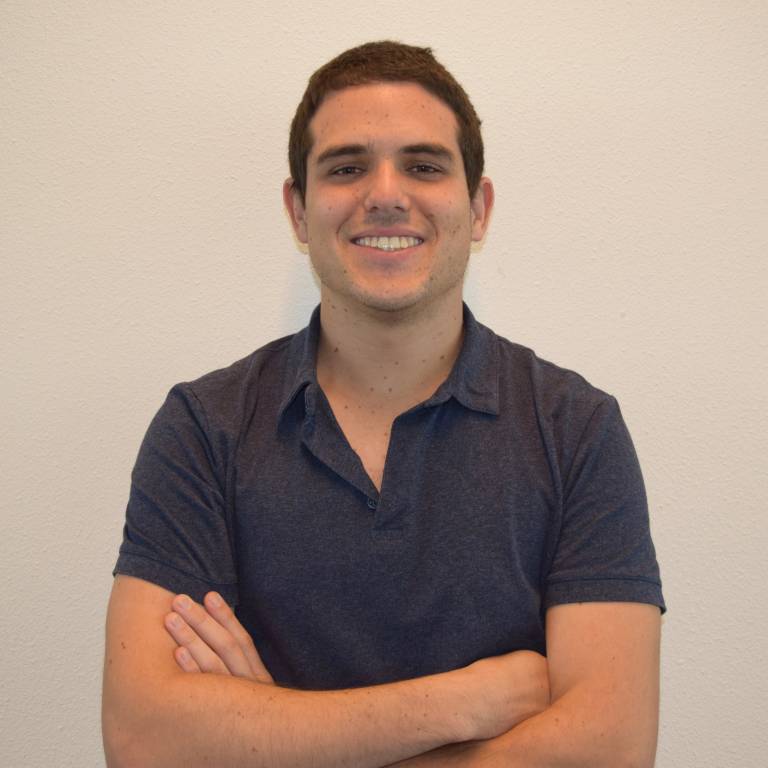Seven questions with Carlos Alberto Ledezma
9 February 2018
This week, meet Carlos Alberto Ledezma, who is a PhD student in UCL's Mechanical Engineering Department and is also part of the Marie-Curie training network.
 Carlos' research project is focusing on using mathematical models for the electrical activity of the heart to understand and aid with the diagnosis of cardiac diseases.
Carlos' research project is focusing on using mathematical models for the electrical activity of the heart to understand and aid with the diagnosis of cardiac diseases.
Project: VPH-CaSE (Virtual Physiological Human - Cardiac Simulation and Experimentation for Personalised Medical Devices).
Website: http://www.vph-case.eu
Research Group: Multiscale Cardiovascular Engineering Group (www.ucl.ac.uk/muse)
1. Why are you interested in cardiovascular diseases?
Cardiovascular diseases are the leading cause of death in the world. Of all the CVDs, the coronary heart disease (CHD) is the deadliest, it causes around 7.4 million deaths worldwide. CHD is an occlusion of the vessels that irrigate the heart, consequently the cardiac cells don't receive the oxygen they need and die. The most common outcome of CHD is a heart attack. The impairment of oxygen influences how the cells react to electrical impulses, so by analysing the electrical activity of the heart we may be able to predict a heart attack with enough advance to prevent it and so help the patient. Developing techniques that help us understand how and when these changes occur and how we can quantify and measure them has the potential to help millions of people! How not to be interested?
2. What do you plan to do in the future?
There is a paradigm shift happening in healthcare as we speak. Much investment is being made in taking the hospital to the patient as opposed to making the patient go to the hospital. Providing healthcare at home supposes a massive technological challenge, it involves wearable devices, telemedicine, automatic risk assessment, artificial intelligence and novel ways of treating patients. After my studies I would like to work with anyone (industry, academia or hospital) that is interested in addressing this challenge.
3. What is the most interesting thing you've done, seen or got involved with while at UCL?
My project is part of a Marie-Curie training network. This has given me the opportunity to collaborate with many UK and international partners. The most interesting part of my PhD has been the opportunity to work with different people, in different research groups, in different countries.
I spent some time with LifeTec Group, in the Netherlands; they make a beating (pig) heart experiment which I found impressive every time I saw. I also had the opportunity to visit the Oxford Computational Biology and Health Informatics Group, one of the leading groups in the UK in cardiac modelling, and collaborate with them in a very interesting project. Finally, the network has provided three training activities (one in Eindhoven, one in Milan and one in Lyon) which have been a great opportunity to learn new stuff as well as visit new places.
4. Give us your top three things to do/see/go to in London:
Whenever it's sunny, make the most out of the day, I suggest taking the time to visit every royal park (Hyde, Regent's, Richmond, St. James, Greenwich, etc). In summer or not, each one is a great outdoor experience.
Take up running! There is an immense running community in London, there are well organised events every week (ranging from 5K to Marathons), so it's a great way to stay motivated and healthy.
Go to a West End musical, they may be expensive, but you can find great mid-week deals and it is a unique experience.
5. If you were Provost for the day what one thing would you do?
I would create a team in charge of designing a scheme that encourages people to stay in UCL after their studies. As it is, even if you want it, it's not easy to find a position at UCL after you're done with your PhD and even if you find a position available, it may be on an area of research that is widely different from your actual thesis subject. If there were proper reinforcements for PhDs to continue their research after they submit their thesis, research students would be motivated to undertake more challenging projects because they would know there is a chance to see them completed. I think this would boost the (already good) quality of PhD theses and would help UCL retain all the talent that normally leaves for industry or other universities.
6. Who inspires you and why?
I don't really take my inspiration from a single person. I constantly look after people who I consider successful, that look how I want to look when I am their age, that have personality traits that I would like to have myself or skills that I would like to learn. Then, I try to learn as much from them as I possibly can. My source of inspiration comes from one motto: 'If I am in a room where I am the most capable person in every aspect, then I am in the wrong room'.
7. What would it surprise people to know about you?
I am not the stereotypical research student (but then again, I think very few PhD students are as they make you believe in the big bang theory). I enjoy very much outdoors activities and sports, I have run two marathons (so far) and I am a highly trained underwater scuba diver (certified to dive to depths up to 50 metres). I take my time to do these activities, I run 3 - 5 times a week, sign up for races rather frequently and go on diving trips at least 5 times a year (wishing they were more!); so, as opposed to what many think, the PhD life is not just being in a lab 24/7, 365 days every year.
 Close
Close

